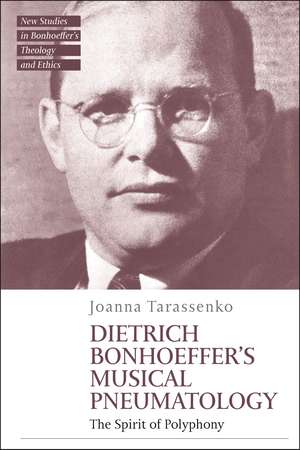The Spirit of Polyphony: Dietrich Bonhoeffer's Musical Pneumatology: T&T Clark New Studies in Bonhoeffer’s Theology and Ethics
Autor Rev Dr Joanna Tarassenkoen Limba Engleză Hardback – 21 feb 2024
Preț: 509.38 lei
Preț vechi: 592.29 lei
-14% Nou
Puncte Express: 764
Preț estimativ în valută:
97.48€ • 101.40$ • 80.48£
97.48€ • 101.40$ • 80.48£
Carte tipărită la comandă
Livrare economică 15-29 aprilie
Preluare comenzi: 021 569.72.76
Specificații
ISBN-13: 9780567713575
ISBN-10: 0567713571
Pagini: 192
Dimensiuni: 156 x 234 x 17 mm
Greutate: 0.45 kg
Editura: Bloomsbury Publishing
Colecția T&T Clark
Seria T&T Clark New Studies in Bonhoeffer’s Theology and Ethics
Locul publicării:London, United Kingdom
ISBN-10: 0567713571
Pagini: 192
Dimensiuni: 156 x 234 x 17 mm
Greutate: 0.45 kg
Editura: Bloomsbury Publishing
Colecția T&T Clark
Seria T&T Clark New Studies in Bonhoeffer’s Theology and Ethics
Locul publicării:London, United Kingdom
Caracteristici
This examination of Bonhoeffer's musico-theology opens the way for Tarassenko to make a compelling case concerning musical metaphors and what they can offer a theology of the Holy Spirit with respect to Christology, with their capacity to convey dual agency.
Notă biografică
Joanna Tarassenko is Assistant Curate at St Clement's Church in Oxford, UK.
Cuprins
Introduction Part One: Dietrich Bonhoeffer's Musico-Theology Chapter One: A Musico-Theological Life Introduction A. Bonhoeffer's musical existence B. Bonhoeffer's musico-theological imagination 1. Aesthetic existence 2. The music of Heinrich Schütz and recapitulation 3. Bach's Art of Fugue and Eschatology Conclusion Chapter Two: A Musico-Theological Invention Introduction A. Polyphony: a musical term B. Polyphony in the prison letters C. A musico-theological invention for love D. A musico-theological invention for life Conclusion Part Two: The Polyphonic Shape of Christian Formation Chapter Three: The Polyphony of Christ Introduction A. A Christological construct B. The Christology Lectures C. The Polyphonic Christ Conclusion Chapter Four: The Contrapuntal Christian Introduction A. Christian formation B. The church through Christ and the Spirit C. Christian formation through the Holy Spirit Conclusion Part Three: Space for the Holy Spirit Chapter Five: A Musico-Pneumatology Introduction A. The 'indirect but pervasive pneumatology' of Ethics B. Space and the Spirit in Ethics C. Musico-pneumatologyConclusion Chapter Six: A Spirit Christology acoustically defined A. Pneumatic Chalcedonianism: an orthodox Spirit ChristologyB. Spirit Christology for Christian formationC. Acoustic space for the SpiritConclusion Conclusion Bibliography
Recenzii
The Spirit of Polyphony not only provides a penetrating exposition of musical metaphors in Bonhoeffer's thought, but also deploys these insights in developing a constructive pneumatology for the church today. In clear and fluid prose, Tarassenko draws on the full range of Bonhoeffer's corpus to provide a compelling model for how through the Spirit divinity and humanity work together in Christ, the believer, and the church as a whole.
In The Spirit of Polyphony, Tarassenko has done a remarkable job, and on two fronts. First, she demonstrates that far from being a peripheral matter for Bonhoeffer, music was critically important in shaping his theological mind. Second, she has shown that a study of this dimension of Bonhoeffer's work yields nothing less than the outline of a fresh and compelling pneumatology for today. This is constructive theology at the highest level.
In The Spirit of Polyphony, Tarassenko has done a remarkable job, and on two fronts. First, she demonstrates that far from being a peripheral matter for Bonhoeffer, music was critically important in shaping his theological mind. Second, she has shown that a study of this dimension of Bonhoeffer's work yields nothing less than the outline of a fresh and compelling pneumatology for today. This is constructive theology at the highest level.









